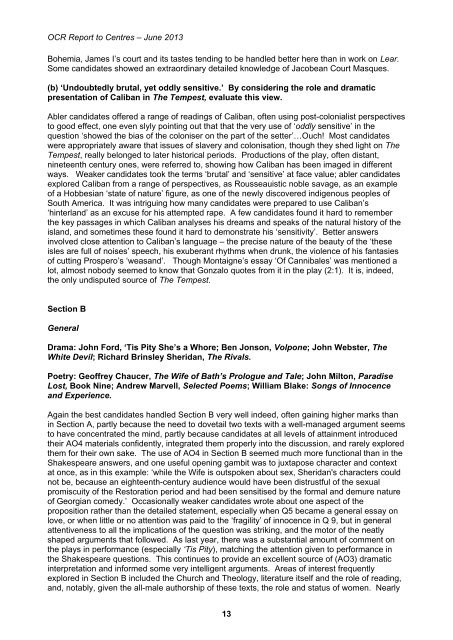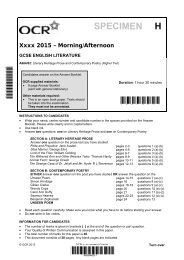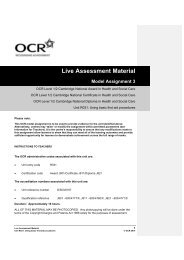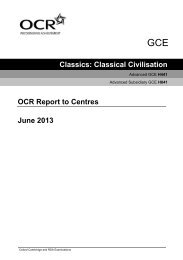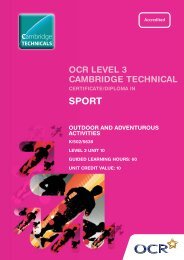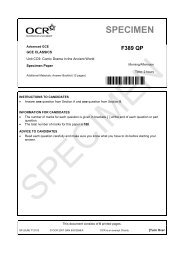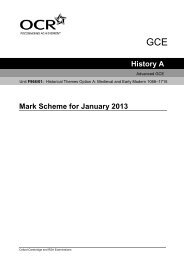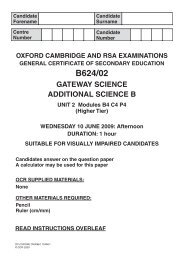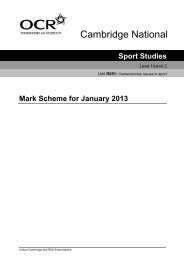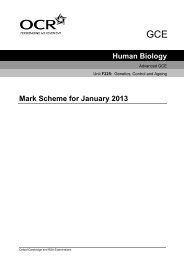Examiners' reports - June (PDF, 385KB) - OCR
Examiners' reports - June (PDF, 385KB) - OCR
Examiners' reports - June (PDF, 385KB) - OCR
You also want an ePaper? Increase the reach of your titles
YUMPU automatically turns print PDFs into web optimized ePapers that Google loves.
<strong>OCR</strong> Report to Centres – <strong>June</strong> 2013<br />
Bohemia, James I’s court and its tastes tending to be handled better here than in work on Lear.<br />
Some candidates showed an extraordinary detailed knowledge of Jacobean Court Masques.<br />
(b) ‘Undoubtedly brutal, yet oddly sensitive.’ By considering the role and dramatic<br />
presentation of Caliban in The Tempest, evaluate this view.<br />
Abler candidates offered a range of readings of Caliban, often using post-colonialist perspectives<br />
to good effect, one even slyly pointing out that that the very use of ‘oddly sensitive’ in the<br />
question ‘showed the bias of the coloniser on the part of the setter’…Ouch! Most candidates<br />
were appropriately aware that issues of slavery and colonisation, though they shed light on The<br />
Tempest, really belonged to later historical periods. Productions of the play, often distant,<br />
nineteenth century ones, were referred to, showing how Caliban has been imaged in different<br />
ways. Weaker candidates took the terms ‘brutal’ and ‘sensitive’ at face value; abler candidates<br />
explored Caliban from a range of perspectives, as Rousseauistic noble savage, as an example<br />
of a Hobbesian ‘state of nature’ figure, as one of the newly discovered indigenous peoples of<br />
South America. It was intriguing how many candidates were prepared to use Caliban’s<br />
‘hinterland’ as an excuse for his attempted rape. A few candidates found it hard to remember<br />
the key passages in which Caliban analyses his dreams and speaks of the natural history of the<br />
island, and sometimes these found it hard to demonstrate his ‘sensitivity’. Better answers<br />
involved close attention to Caliban’s language – the precise nature of the beauty of the ‘these<br />
isles are full of noises’ speech, his exuberant rhythms when drunk, the violence of his fantasies<br />
of cutting Prospero’s ‘weasand’. Though Montaigne’s essay ‘Of Cannibales’ was mentioned a<br />
lot, almost nobody seemed to know that Gonzalo quotes from it in the play (2:1). It is, indeed,<br />
the only undisputed source of The Tempest.<br />
Section B<br />
General<br />
Drama: John Ford, ‘Tis Pity She’s a Whore; Ben Jonson, Volpone; John Webster, The<br />
White Devil; Richard Brinsley Sheridan, The Rivals.<br />
Poetry: Geoffrey Chaucer, The Wife of Bath’s Prologue and Tale; John Milton, Paradise<br />
Lost, Book Nine; Andrew Marvell, Selected Poems; William Blake: Songs of Innocence<br />
and Experience.<br />
Again the best candidates handled Section B very well indeed, often gaining higher marks than<br />
in Section A, partly because the need to dovetail two texts with a well-managed argument seems<br />
to have concentrated the mind, partly because candidates at all levels of attainment introduced<br />
their AO4 materials confidently, integrated them properly into the discussion, and rarely explored<br />
them for their own sake. The use of AO4 in Section B seemed much more functional than in the<br />
Shakespeare answers, and one useful opening gambit was to juxtapose character and context<br />
at once, as in this example: ‘while the Wife is outspoken about sex, Sheridan's characters could<br />
not be, because an eighteenth-century audience would have been distrustful of the sexual<br />
promiscuity of the Restoration period and had been sensitised by the formal and demure nature<br />
of Georgian comedy.’ Occasionally weaker candidates wrote about one aspect of the<br />
proposition rather than the detailed statement, especially when Q5 became a general essay on<br />
love, or when little or no attention was paid to the ‘fragility’ of innocence in Q 9, but in general<br />
attentiveness to all the implications of the question was striking, and the motor of the neatly<br />
shaped arguments that followed. As last year, there was a substantial amount of comment on<br />
the plays in performance (especially ‘Tis Pity), matching the attention given to performance in<br />
the Shakespeare questions. This continues to provide an excellent source of (AO3) dramatic<br />
interpretation and informed some very intelligent arguments. Areas of interest frequently<br />
explored in Section B included the Church and Theology, literature itself and the role of reading,<br />
and, notably, given the all-male authorship of these texts, the role and status of women. Nearly<br />
13


